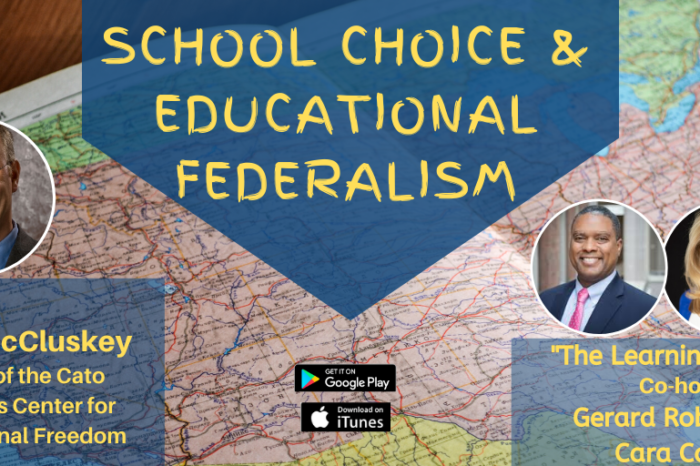Cato’s Neal McCluskey on School Choice & Educational Federalism
Special thanks to Bob Bowdon & Choice Media for helping us launch “The Learning Curve”!
On this episode of “The Learning Curve,” Cara welcomes new co-host Gerard Robinson and guest Neal McCluskey, Director of the Cato Institute’s Center for Educational Freedom. They discuss America’s growing interest in school choice, with 500,000 children now attending private schools through vouchers, tax credits, or Education Savings Accounts, and another three million enrolled in charter schools. They also review President Trump’s federal tax credit proposal, its questionable constitutionality, and its prospects in Congress. Neal describes his public schooling “Battle Map” project that catalogues social conflict in K-12 education, and demonstrates the merits of greater school choice as a mechanism for ensuring government remains neutral in disputes between religious liberty and civil rights. Plus, the avid grillmaster shares his BBQ tips!
Stories of the Week: A proposal to give the New York state education department more regulatory authority over private and religious schools has been put on hold. Is increased oversight of private school curricula necessary to ensure accountability, or an infringement on local autonomy? Military families addressed Congress this week to fix the Exceptional Family Member Program, which is supposed to cover services, including private school tuition costs in some cases, for children with special needs. The program has been meeting with resistance from public school districts claiming they can provide sufficient services, forcing families to fight costly legal battles. Is the program a well-deserved benefit for those serving our country, or an unnecessary financial drain on public school systems?
Newsmaker Interview Guest:
 Neal McCluskey is the Director of Cato’s Center for Educational Freedom. He is the author of the book Feds in the Classroom: How Big Government Corrupts, Cripples, and Compromises American Education. His writings have appeared in such publications as the Wall Street Journal, the Washington Post, and Forbes. In addition to his written work, Neal has appeared on PBS, CNN, the Fox News Channel, and numerous radio programs. McCluskey holds an undergraduate degree from Georgetown University, where he double??majored in government and English, has a master’s degree in political science from Rutgers University and holds a Ph.D. in public policy from George Mason University. Neal tweets at @NealMcCluskey.
Neal McCluskey is the Director of Cato’s Center for Educational Freedom. He is the author of the book Feds in the Classroom: How Big Government Corrupts, Cripples, and Compromises American Education. His writings have appeared in such publications as the Wall Street Journal, the Washington Post, and Forbes. In addition to his written work, Neal has appeared on PBS, CNN, the Fox News Channel, and numerous radio programs. McCluskey holds an undergraduate degree from Georgetown University, where he double??majored in government and English, has a master’s degree in political science from Rutgers University and holds a Ph.D. in public policy from George Mason University. Neal tweets at @NealMcCluskey.
Commentary of the Week:
Edutopia: New Studies Link the Arts to Crucial Cognitive Skills
Tweet of the Week:
“We’re likely living through the most rapid change in family structure in human history. The causes are economic, cultural, and institutional all at once.” Read our latest cover story from @nytdavidbrooks. https://t.co/b6yxvuwKar
— The Atlantic (@TheAtlantic) February 10, 2020
Next episode’s guest – “Macke” Raymond of CREDO – February 21, 2020:
Margaret “Macke” Raymond is the Founder and Director of the Center for Research on Education Outcomes (CREDO) at Stanford University.
Newslinks:
NY Post: NY education officials pause more private school control after backlash
Stars & Stripes: Military Families Take Fight For Special Education To Capitol Hill
https://www.disabilityscoop.com/2020/02/11/military-families-special-education-capitol-hill/27798/
Edutopia: New Studies Link the Arts to Crucial Cognitive Skills
https://www.edutopia.org/video/new-studies-link-arts-crucial-cognitive-skills
Get Updates on Our School Choice Research
Listen to past episodes!

























